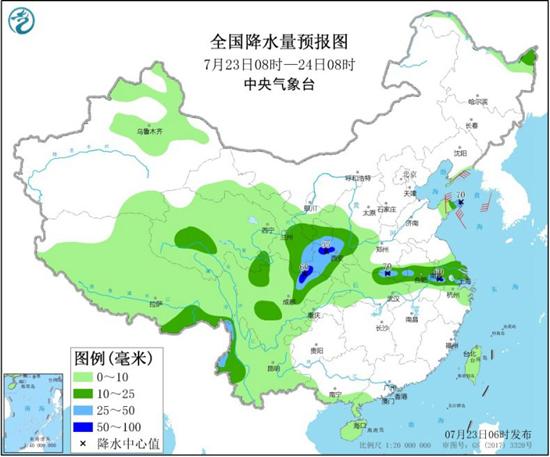China Weather News forecasts that today (July 23) the rainfall in the Huanghuai area has significantly weakened, but there are still heavy rains in parts of Shandong, Anhui, Jiangsu, and Sichuan. From tomorrow to the 26th, a new round of rainfall will return to the Yangtze River Basin. Local rain is strong, so pay attention to prevention. In addition, today the large-scale hot weather in the south will continue, and the feeling of "steaming" is obvious.
Yesterday, the Three Gorges Reservoir exceeded the flood limit water level and implemented flood discharge. (Photo/Meng Fang)
Yesterday, the country's "water and fire are two heavens", the Huaihe River Basin entered the strongest period of this round of rainfall, such as Luohe, Henan. As of 14:00 yesterday, the accumulated rainfall in 24 hours exceeded 172 mm. Such strong rainfall occurred in July. Relatively rare. In the Jiangnan and South China areas yesterday, large-scale high temperature "standby", such as Hangzhou, Nanchang, and Fuzhou all "firepower", the temperature in Fuzhou once rose to 38°C.
The rainfall in Huanghuai area weakened today. The Central Meteorological Observatory predicts moderate to heavy rain in parts of eastern Shandong Peninsula, southeastern Tibet, western Yunnan, southern Qinghai, eastern Northwest China, northern Sichuan, western Jianghuai, and northeastern Jiangnan. Among them, eastern Shandong Peninsula and northwest Sichuan Basin , Southwest Shaanxi, southern Henan, southeast Anhui, southwest Jiangsu and other places have heavy rain (50-70 mm).
Starting tomorrow, a new round of rainfall will return to the Yangtze River Basin. It is estimated that there will be moderate to heavy rains in parts of northwest Inner Mongolia, southeast Tibet, most of Sichuan, eastern Northwest China, western Jianghuai, and northeastern Jiangnan. Among them, southeastern Tibet, southeastern Gansu, southwest Shaanxi, and northwest Sichuan Basin There are heavy rains or heavy rains (100-120 mm) in some areas of the province.
From 08:00 on July 25 to 08:00 on July 26, there were moderate to heavy rains in parts of central Inner Mongolia, southeastern Tibet, central southwestern, southeastern Northwest China, western Jianghan, western Huanghuai, western Jianghuai, and northeastern Jiangnan. Among them, there were heavy rains or heavy rains (100-200 mm) in parts of central and southern Anhui, southeastern Sichuan, southwestern Chongqing, and northwestern Guizhou.
Meteorological experts reminded that in the next few days, we still need to pay attention to the impact of heavy rainfall on the flood conditions in the Yangtze River and Huai River basins. The public should avoid areas with high disaster risk when going out and do a good job in flood prevention. In addition, the southeastern part of the southwestern region and the Sichuan Basin will experience heavy rainfall in the next few days. The public needs to be alert to geological disasters such as mudslides and landslides, and to guard against mountain floods in northeastern Sichuan.
In terms of temperature, in places such as Huanghuai and Jianghuai where rainfall is frequent, the highest temperature in many places in the next few days will not exceed 30℃. For example, the highest temperature in Hefei on the 24th is only 27℃, and the body feels slightly humid and cool.
In Jiangnan and South China, controlled by the subtropical high pressure, the sultry sensation is still very obvious due to the high air humidity. It is a veritable "small summer heat, steaming up and down cooking". The high temperature in South China is the hardest to "shake", and Fuzhou and Guangzhou will almost always "check in" the high temperature in the next five days.
In Jiangnan area, due to the heavy rain since the flood season, the high temperature "absent" or "late", the high temperature today and tomorrow will open the "card replenishment" mode, such as Hangzhou and Nanchang will have high temperatures today. Starting on the 25th, as the rain develops, the high temperature in the south of the Yangtze River will temporarily weaken.

